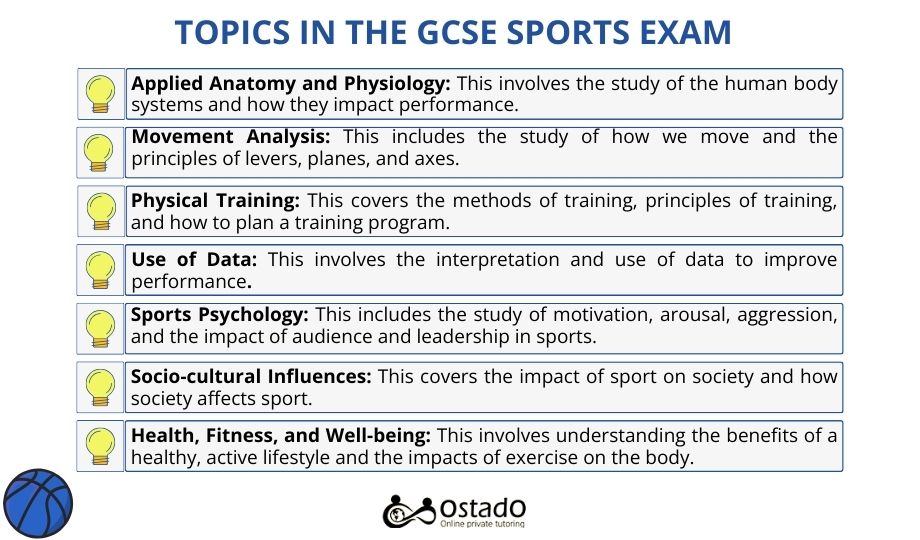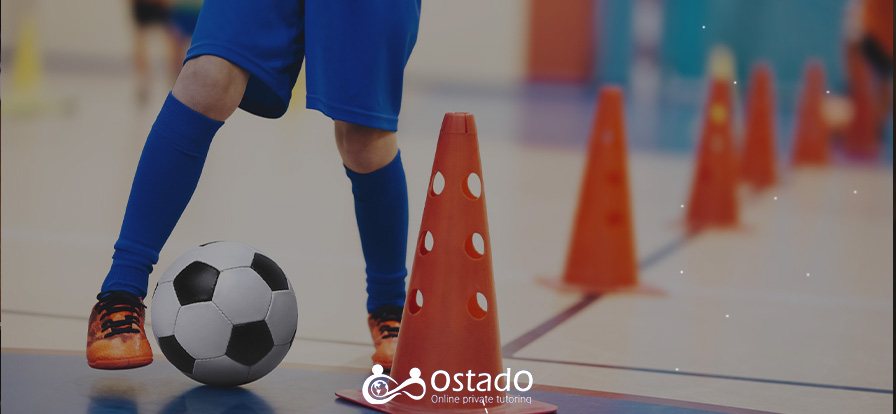Revising for the GCSE Physical Education qualification is one of the practical aspects of the GCSE examination. It gives you invaluable information about your body and how to maintain your health. Physical Education is probably the most fascinating discipline for kinesthetic learners, but those who prefer to stay inside the class and stick with theories might need to put extra effort into GCSE PE to get good results. In this article, I briefly mention what is included in GCSE sports science and give you some revision tips for GCSE Physical Education.
- Write a comprehensive study plan to cover all GCSE PE topics.
- Learn test-taking strategies.
- Practise past papers to familiarise yourself with different types of questions.
- Find information about different exam boards.
- Use different revision resources to prepare for any type of questions.
What topics are covered in the GCSE PE syllabus?
1. Applied Anatomy and Physiology
This subject is about the systems in the human body, their function and their role in our performance. For instance, pupils learn about the skeletal system, respiratory system, muscular system, etc.
Example question: Describe the action of the diaphragm when breathing in. (2)
2. Movement Analysis
Movement Analysis describes how different body parts move. In this subject, students learn about body planes and different kinds of movements for each body part, including extension, abduction, auction, rotation, circumduction, etc. Additionally, the topic covers how we can lift things or exert force on things using our joints.
Example question: What are the functions of the skeleton?
3. Physical Training
In Physical Training, students learn about different training methods and how to plan and oversee personal training. By learning the concepts of physical training, students can set specific exercise plans to strengthen certain body parts.
Example question: Explain what would happen if a person did not schedule a rest day into their training programme.
4. Use of Data
In Physical Education, students deal with different kinds of numbers resulting from different kinds of measurements. Students learn how to collect, analyse and interpret this data. They also understand the difference between qualitative and quantitative data and the statistical methods that can be applied to sports science.
Example question: Give examples of quantitative data in Physical Education.
5. Sports Psychology
We cannot learn about our body and physique without paying attention to the psychological aspects of sports. Sports Psychology teaches students psychological factors that affect our performance and explains different ways through which we can learn and improve open and closed skills. For instance, archery, tennis, and martial arts require concentration, and performing well in team sports such as soccer requires emotional stability and adaptation skills to work well with other team members.
Example question: Explain how imagery can help a sports performer mentally prepare for effective performance.
6. Socio-cultural Influences
This topic is about how sports affect society and how society contributes to the expansion of sports and sports events. For instance, under this topic, pupils learn about the commercialisation of physical activities and sports, diversity in sports, globalisation of sports, etc.
Example question: How do social groupings influence participation in sport?

How to prepare for the GCSE sports science?
The GCSE Physical Education qualification consists of two parts. The first part is the exam that tests your theoretical grasp of the abovementioned topics, and the second part is a non-exam assessment of three different physical activities. You can choose the activities from a wide range of individual and team sports. In order to succeed in the GCSE sports science component, you can benefit from the following guidelines.
Create a Revision Plan
The revision process requires planning. You should start early to be able to cover all components of the GCSE exam, including Physical Education. For long-term study plans, two to three hours of studying is enough, but as you get closer to the exam date, you should spend more time on the revision. In your study plan, you should dedicate some time to reviewing what you have studied so far. Or, you can review what you previously studied each time you want to study new materials.
Acquire exam techniques and strategies
“Understanding the question is half an answer.” Understand and follow the instructions given in the exams. Sometimes, you know the answer to the question, but you do not get any marks because you have not answered according to the task requirements. Read the exam question terminology to better understand what you must do for each question or problem. Ultimately, understanding the questions allows you to plan your answer more quickly and with more certainty.
Find information about exam boards
All exam boards meet the standards of Ofqual and test only the subjects and topics covered in the National Curriculum. However, there are slight differences in specifications for exam boards (e.g., AQA, Edexcel, OCR) in the way they design the questions and adjust their complexity. You should gather information about these specifications to know what you should expect in the exam session in advance.
Practice past papers
Practising exam questions is helpful in many ways. First of all, it familiarises you with the exam format and the phrasing of the questions. Additionally, you can understand the marking scheme. Normally, the marks of a question indicate the number of steps you need to take or the parts of the answer. For instance, a question with 3 marks means that the answer has three parts.
Evaluate you performance
Second, it gives you a chance to check your performance. In order to get the most out of the practice papers, you should set time limits and simulate the exam conditions to see how you perform under pressure.
Ace the GCSE exam with Ostado’s tutors
Ostado is a leading tutoring platform in the UK, but our tutors and clients come from all around the world. We have gathered the best tutors to help pupils improve their marks and achieve educational excellence. You can explore the list of Ostado GCSE tutors and select the ones that match your preferences. Our tutors hold online classes depending on the student’s current knowledge and their educational goals.
Use revision resources
By using different resources, you eliminate the element of surprise in the exam session. That is, you will be ready for any kind of questions in the exam. Additionally, using different resources makes the revision process more interesting. I have listed some of these resources in the table below.
Use revision resources
By using different resources, you eliminate the element of surprise in the exam session. That is, you will be ready for any kind of questions in the exam. Additionally, using different resources makes the revision process more interesting. I have listed some of these resources in the table below.
| Resources for GCSE Physical Education | ||
| # | Resource | Description |
| 1 | Save My Exams | This platform provides an extensive collection of resources, including revision notes, topic questions, model answers, past exam papers, and more. |
| 2 | Quizlet | Quizlet offers a range of interactive study tools for GCSE Physical Education revision. It includes flashcards, quizzes, and games that are based on the exam board specifications. |
| 3 | TES | TES provides a selection of ready-to-use GCSE PE revision resources. From lessons and practice questions to in-class activities and knowledge organisers, there’s something to engage every student. |
| 4 | Revise AQA GCSE (9-1) Physical Education | Closely matched to the AQA specification. One topic-per-page format provides hassle-free revision for students with no lengthy set-up time and no complex revision concept. |
| 5 | GCSE Physical Education Complete Revision & Practice | The book provides clear revision notes and practice questions for GCSE Physical Education. It includes detailed notes on every topic, examples, exam-style questions, and a set of realistic practice papers. |
| New GCSE Physical Education AQA Revision Guide | This guide is specifically designed for the AQA exam board. It contains clear notes covering every topic, examples, exam-style questions, and access to online quizzes and knowledge organisers. | |
| 6 | GCSE Physical Education Revision Guide | This guide covers everything students need for success in Grade 9-1 GCSE Physical Education. It simplifies key GCSE topics into bite size chunks of information to improve students’ understanding and boost confidence. |
| 7 | CGP Books GCSE Physical Education OCR Revision Guide | This guide is specifically designed for the OCR exam board. It contains clear notes covering every topic, examples, exam-style questions, and access to online quizzes and knowledge organizers. |
| 8 | GCSE Physical Education Revision Guide (Daydream Education) | This guide breaks down the whole Physical Education GCSE curriculum into easily digestible chunks. It also includes a free digital version featuring over 1000 assessment questions. |
See what is missing
Third, practising past papers helps you identify the gaps in your knowledge. Which topics are challenging for you? Spend more time and energy on those subjects to increase your marks. Of course, what challenges you might not necessarily be about the PE subjects. Maybe you need to work on managing your time or controlling your stress level.
Monitor your progress
Finally, practice papers can be the means of assessing your progress. As you are revising for the GCSE Physical Education, you can practise past papers regularly on the challenging topics and check whether you have improved.
Maths is one of the core components of the GCSE exam and it is the most complex discipline. Maths tutors have the highest demands and the tuition fee is usually high. You can find expert and reasonable GCSE maths tutors at Ostado to help you improve your maths skills.
Fitness is an essential aspect of our lives, and it has a say in our education success. You can get great marks in the GCSE PE exam using the guidelines mentioned above. Remember to plan in advance and do not leave the revision to the last minute. Maintain a balance between your life and education; too much studying does not necessarily result in success. Finally, you can always get help from a tutor to catch up with other candidates and get excellent marks. If you decide to look for online tutors, I suggest you read the article on “Choosing a tutor” beforehand.
FAQs - GCSE Physical Education Revision
- Is GCSE PE practical hard?Students can choose three sports based on their strengths and preferences. It can be an individual or team sport. Also, the emphasis of PE is more on theory (60%) than practical (40%). Therefore, GCSE PE practical is as easy as it can be.
- Is PE an easy GCSE?According to a poll by Think Student, GCSE PE is among the ten easiest subjects in the GCSE exams. But as the focus has shifted more on theory, it has become harder.
- How long is the GCSE PE exam?The duration of the GCSE PE exam depends on the exam board. Generally, it consists of two papers, each taking 75 minutes.

